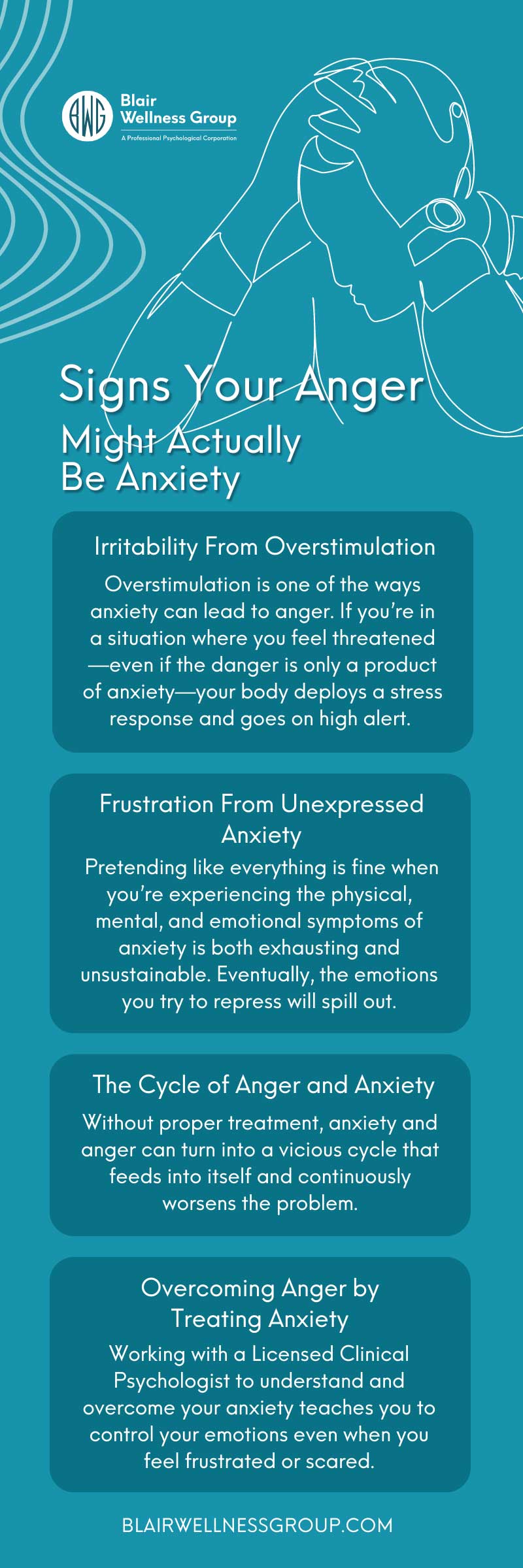When people think about the emotions behind anxiety, they often think about feelings of fear, worry, or dread. They might also consider the link between anxiety and sadness or loneliness. However, one emotion that people often overlook is anger.
There is a significant link between anxiety and anger that can be frustrating, embarrassing, and exhausting if you do not acknowledge it. By understanding the ways that anxiety feeds anger, and vice versa, you can regulate feelings of anger and prevent it from taking over your life. Learn more about the connection between anger and anxiety, common signs your anger might actually be anxiety, and how you can overcome both.
Symptoms of Anger and Anxiety
One of the things linking anger and anxiety together is their physical symptoms. The body reacts in similar ways to both anxiety and anger. Some overlapping symptoms of anger and anxiety include:
- Shortness of breath
- Rapid heart rate
- Tightness in the chest
- Tense or clenched muscles
- Hot flashes
- Shakiness
- Restlessness
- Nausea or a churning feeling in the stomach
Because your body’s physical reaction to anxiety can feel like anger, your mental and emotional reactions can be complicated or confusing. Moreover, irritability and frustration are symptoms of anxiety in and of themselves. For these reasons, anxiety and anger can be intertwined in a way that is hard to navigate, making it difficult to determine what is anger and what is anxiety.
Irritability From Overstimulation
Overstimulation is one of the ways anxiety can lead to anger. If you are in a situation where you feel threatened—even if the danger is only a product of anxiety—your body deploys a stress response and goes on high alert. Combined with relentless feelings of fear or worry, this tense state can cause you to feel overwhelmed and overstimulated. This, in turn, can lead to a shorter temper that causes you to feel irritable or frustrated in response to seemingly insignificant problems.
One example of irritability from overstimulation is road rage. Say you have an important meeting to get to, but you are stuck in heavy traffic. Worries about showing up late, making a bad impression, and failing to achieve what you need to at this meeting cause you to feel stressed. Stress turns into impatience, which quickly turns into frustration and anger toward other drivers.
Frustration From Unexpressed Anxiety
Another way anxiety feeds anger is when you try to repress it. Many people attempt to ignore or brush off feelings of anxiety. Anxiety Disorders do not just go away on their own, though. Pretending like everything is fine when you are experiencing the physical, mental, and emotional symptoms of anxiety is both exhausting and unsustainable. Eventually, the emotions you try to repress will spill out.
When this happens, many people express their emotions through anger rather than fear, sadness, or uncertainty. This is especially true for men due to the way that society criticizes male emotions and toxic masculinity. Society sees anger as a more masculine emotion than fear or worry, so many men feel that expressing their anger is more acceptable than expressing their anxiety.
The Cycle of Anger and Anxiety
Without proper treatment, anxiety and anger can turn into a vicious cycle that feeds into itself and continuously worsens the problem. Many people with an Anxiety Disorder—or with any kind of Mental Health Disorder—feel angry about the challenges they face and the way their mental health affects their lives. You might grow frustrated with your body’s response to anxiety, the limitations you face because of untreated anxiety, or even your own perceived inability to handle anxiety.
At the same time, feelings of anger can create even more feelings of anxiety. Many people feel guilty or ashamed after an angry outburst. This is particularly true if you take your anger out on someone who does not deserve it—especially if that person is someone you care about. Shame about your anger or worry about the effects of your outburst can feed into feelings of fear, dread, low self-esteem, and other symptoms of anxiety.
Signs Your Anger Stems From Anxiety
It is not always easy to tell when your anger comes from anxiety and when it is just anger. However, there are a few signs that might indicate your anger actually stems from anxiety. By taking a clear look at what triggers feelings of anger and why, you can confront the problem at its core and gain better control over your emotional responses.
You Are Going Through Life Changes
Change—especially significant change—is one of the most common sources of anxiety. A big move, a switch in your career, a breakup, or the death of a loved one can upset your routine and leave you feeling lost or uncertain. In some cases, that feeling of being powerless can cause you to lash out so you do not have to feel afraid or vulnerable.
You Feel a Lack of Agency and Control Over Your Emotions
Similar to big life changes, a lack of agency and control over your emotions, reactions, and impulses can leave you feeling afraid, anxious, worried, and uncertain. From facing limitations at work to feeling stuck in a relationship, a loss of control is hard to accept. You might feel angry at the situations you cannot change, at the people who are putting limitations on you, or at yourself for not being able to fix everything. Behind this anger, though, is the fear and stress that comes with feeling helpless.
You Feel Hurt or Sad
In addition to fear and doubt, anxiety can cause feelings of sadness. This can lead to isolation and loneliness, putting a strain on relationships with friends and family. Expressing sadness, loneliness, or hurt means making yourself vulnerable in front of others, which is not easy. That is why many people lash out instead—especially if they feel hurt, betrayed, unheard, overwhelmed, stuck, or sad because of the way someone treats them and their relationship.
You Feel Threatened or Afraid
When you feel threatened or afraid—either because of physical danger or because of perceived danger that stems from anxiety—your body defaults to a stress response. Among these stress responses is the urge to fight or defend yourself. If your body chooses fight over flight, freeze, or another response, it can seem like a general outburst of anger. However, the underlying issue is still the anxiety that your body is responding to.
Overcoming Anger by Treating Anxiety
When anxiety is the underlying issue, you cannot control your anger without treating anxiety. Working with a Licensed Clinical Psychologist to understand and overcome your anxiety teaches you to control your reactions, impulses, and emotions in face of anxiety, fear, sadness, and feeling overwhelmed.
At Blair Wellness Group, we understand how complicated anxiety can be and how it can adversely impact your personal and professional relationships. That is why our anxiety treatment services take a personal approach to your mental health. Make an appointment with Blair Wellness Group today and start healing from anxiety, anger, and any other challenges you face due to your Mental Health Disorder.















